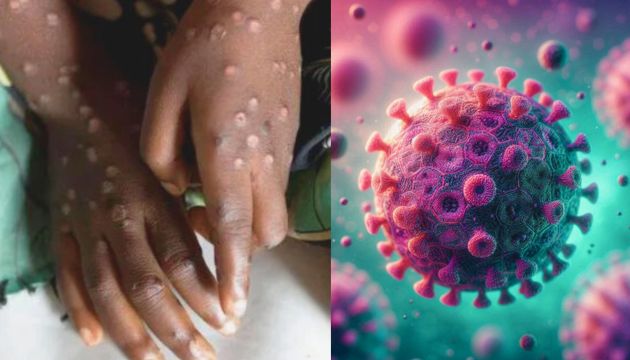ISLAMABAD: Prime Minister Shehbaz Sharif’s Coordinator for Health, Dr. Mukhtar Ahmed, said that in recent days, a case of monkeypox has come to light in Pakistan, which was reported in Khyber Pakhtunkhwa.
In a media briefing, he said: “On April 11, 2023, the first case of monkeypox was reported in Pakistan, and since then, a total of 11 cases of monkeypox have been reported in the country, out of which only one patient died.”
Dr. Mukhtar Ahmed Bharath also said that the reason for the death of this patient was not monkeypox but rather the presence of the AIDS virus, which weakened his immunity so much that he could not survive.
In a media briefing on Saturday, the Prime Minister’s Coordinator for Health also said that those who tested positive for monkeypox had traveled to several Gulf states.
However, the question arises as to what monkeypox is and what precautions should be taken against it.
What is Monkeypox or Mpox?
Monkeypox, or ‘Mpox,’ was discovered by scientists in 1958 when a ‘pox-like’ disease broke out in monkeys. Until recently, the disease in humans was observed in people in Central and West Africa who came into close contact with infected animals.
In 2022, the virus was first confirmed to be sexually transmitted and has led to an epidemic in more than 70 countries worldwide.
What is Symptoms of Mpox?
M-pox belongs to the same family of viruses as smallpox, and its symptoms include fever, chills, and body aches.
In more severe cases of this disease, lesions develop on a person’s face, hands, chest, and genitals.
Common symptoms of Mpox are:
- Rash
- Fever
- Muscle aches
- Headache
- Sore throat
- Low energy
- Back pain
- Swollen lymph nodes.
Mpox Transmission:
Person-to-person transmission of mpox can occur through direct contact with infectious skin or other lesions, such as those in the mouth or on the genitals. This includes contact that is;
- Face-to-face contact (talking or breathing)
- Mouth-to-mouth contact (kissing)
- Skin-to-skin contact (touching or vaginal/anal sex)
- Mouth-to-skin contact (oral sex or kissing the skin)
- Respiratory droplets or short-range aerosols from extended close contact
How to Protect Yourself from Mpox;
According to information on the World Health Organization (WHO) website, if someone you know is diagnosed with or suspected of having M-pox, avoid close contact with them, including sexual contact.
Know the symptoms of monkeypox and get yourself checked regularly.
If you have symptoms, seek health advice and self-isolate while waiting to be tested.
WHO guidelines state that vaccination should be mandatory if a vaccine is available. Keep your environment sterile and avoid the company of a person who has the virus.
Be aware of M-pox in your area. Talk openly about the disease with people you have close contact with, especially sexual contact.
How to Protect Others from Mpox;
WHO has said that the affected person should be quarantined. Use a separate bathroom, or clean the washroom with disinfectant after each use.
The World Health Organization’s advisory states that personal items such as cups, bedding, towels, and electronics should be used separately. Wash hands frequently with soap and water or hand sanitizer. Clean frequently touched items regularly. Avoid sweeping and vacuuming.
Wash your own clothes. Put the clothes in a plastic bag before putting them in the washing machine, and keep the windows of your house open.
Remember, monkeypox can be spread through contact with an infected person, so be careful.











